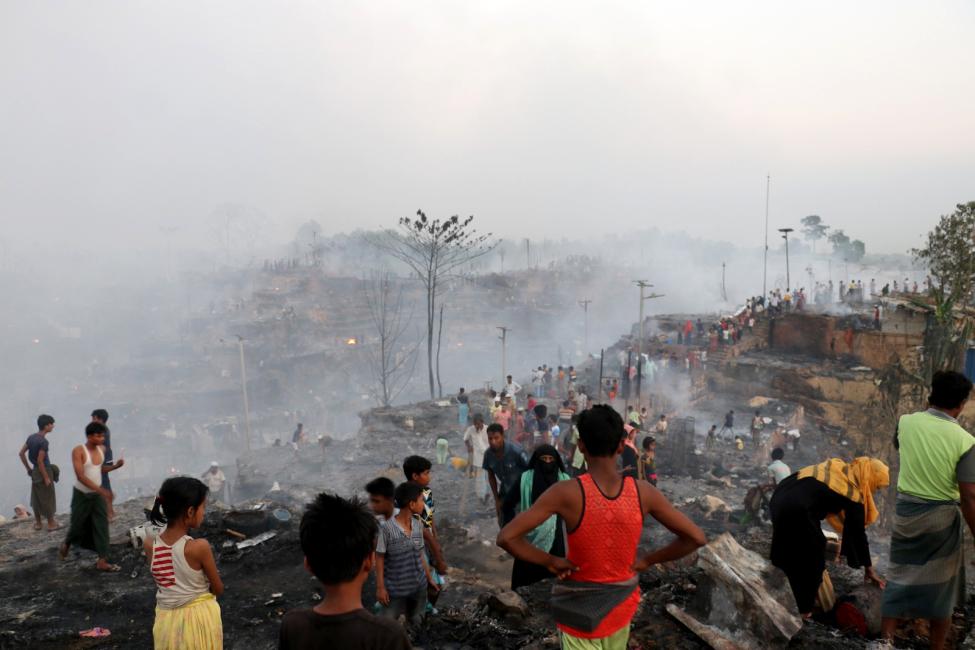
Cox’s Bazar – The large fire that swept through camp 11 under IOM’s area of responsibility in Cox’s Bazar yesterday (05/03), impacted around 12,000 Rohingya refugees, causing considerable damage to significant sections of the world’s largest refugee camp.
Around 2,000 shelters were destroyed in the fire while many of the affected refugees lost all their belongings leaving many experiencing fear, despair, and hopelessness.
The fire was first reported around 2:45 pm local time on Sunday afternoon, and IOM immediately mobilized response teams to assist the refugees and bring the situation under control in coordination with the local authorities and fire brigade. IOM also mobilized its Disaster Management Unit (DMU) volunteers to create fire breaks to stop the fire from spreading and mitigate the loss to life and property. The cause and origin of the fire are unknown at this stage. Thankfully, no fatalities have been reported thus far.
Immediately after the incident, IOM sent two mobile medical teams with 14 ambulances to assist as needed. Additionally, we deployed our eight trained Communications with Communities (CwC) teams to ensure people have access to the right information. With this, community mobilizers engaged in crowd control and emergency referrals.
IOM is collaborating with other humanitarian actors on the ground to conduct assessments to gauge the damage caused by Sunday’s fire and the immediate and long-term needs for those affected.
IOM, in coordination with other humanitarian agencies, is targeting distribution of emergency shelter kits consisting of tarpaulins, bamboo, and ropes to all the affected families. Less than 24 hours since the fire, 900 Rohingya volunteers have been mobilized through cash-for-work initiatives, to support the removal of debris from the site.
“We are coordinating with other humanitarian actors to ensure that those affected are provided with immediate needs including food; health; protection; water, sanitation and hygiene needs. Following the fire incident, refugees from these camps are looking to recover from the loss, damage and shock; we will support them with assistance for shelter repair/rebuilding and access to cooking facilities – in the form of LPG [liquified petroleum gas] as top priorities in the days to come,” said Fathima Nusrath Ghazzali, Officer-in-Charge for IOM Bangladesh.
The conditions in the camps make large fires a real risk. In March 2021, a massive fire that broke out in the camp resulted in the loss of lives, displaced 45,000 Rohingya refugees, and caused significant damage to the world’s largest refugee camp.
On 2 January 2022, a fire caused significant damage to IOM’s Severe Acute Respiratory Infection and Isolation and Treatment Center (SARI ITC) in camp 20 Extension and was, unfortunately, followed by a second fire a week later where a section of the Rohingya refugee camp 16 was razed to the ground, leaving more than 1,700 refugees affected with no fatalities.
IOM’s initial estimates of the response to the damage in the areas of shelter; cooking fuel; site management and development; water, sanitation and hygiene; and health amount to USD 7.4 million.
For more information, please contact:
In Cox’s Bazar:
Tarek Mahmud in Cox’s Bazar [email protected]
Md Sariful Islam in Dhaka [email protected]
In RO Bangkok:
Itayi Viviri, [email protected]
In Geneva:
Diego Pérez Damasco, [email protected]
